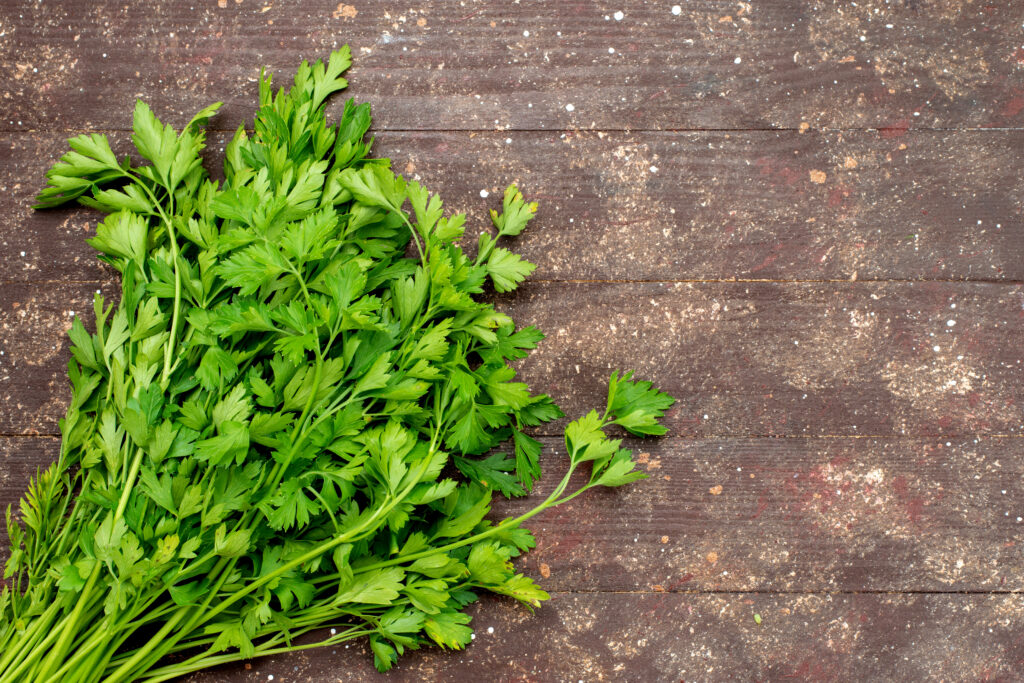The humble parsley (Petroselinum crispum) is a true superfood in disguise. This verdant herb, native to the Mediterranean region, has been cherished in traditional medicine for centuries, and modern research is uncovering its remarkable potential to support our well-being in various ways.
A Nutritional Powerhouse: Unveiling the Secrets of Parsley
Parsley is a leafy green herb that comes in two main varieties: curly parsley, with its ruffled leaves, and flat-leaf parsley, with its smoother, broader leaves. Both varieties boast a slightly peppery flavor and a vibrant green hue.

What makes parsley truly remarkable is its impressive nutritional profile. This unassuming herb is a rich source of vitamins A, C, and K, as well as essential minerals like potassium, calcium, and folate. Additionally, parsley is a treasure trove of antioxidants and unique plant compounds, such as apiol and myristicin, which may offer potential health benefits.
Digestive Delight: Parsley’s Potential for Gut Health
One of the most promising health benefits of parsley lies in its impact on digestive well-being. This herb contains a good amount of dietary fiber, essential for promoting healthy gut bacteria and aiding digestion. Furthermore, some studies suggest that parsley may possess mild antimicrobial properties, which could help combat harmful gut bacteria.
While more research is needed to fully understand parsley’s impact on gut health, incorporating this flavorful herb into your diet may support a happier, healthier digestive system.
Fresh Breath Hero: Can Parsley Really Freshen Breath?
Parsley has a long-standing reputation as a natural breath freshener, and there may be some scientific merit to this traditional use. The chlorophyll content in parsley might help neutralize bad breath caused by food particles or bacteria.
However, it’s important to note that while parsley may offer temporary relief from bad breath, it should not replace proper oral hygiene practices like brushing and flossing. If you experience persistent bad breath, it’s best to consult a dentist to identify and address any underlying issues.
Blood Sugar Management: Parsley’s Potential Role
The role of parsley in blood sugar management is an intriguing area of research. Preliminary studies suggest that parsley leaf extracts may help regulate blood sugar levels, potentially by increasing insulin sensitivity and reducing oxidative stress, which can contribute to insulin resistance.
:max_bytes(150000):strip_icc()/GettyImages-468941305-2000-c09248c699b749c3b8cb54e5ae82a0bc.jpg)
While these findings are promising, it’s crucial to remember that a balanced diet, regular exercise, and stress management are essential for optimal blood sugar control. Parsley may offer some benefits, but it should not be viewed as a substitute for these fundamental practices.
Bone Health Hero: Parsley’s Contribution to Strong Bones
Parsley is an excellent source of vitamin K, a crucial nutrient for bone mineralization and blood clotting. Adequate vitamin K intake, combined with a balanced diet rich in calcium and other essential nutrients, can support strong and healthy bones.
While parsley alone may not be a magic bullet for bone health, incorporating it into a well-rounded diet can contribute to meeting your daily vitamin K needs and potentially benefiting your bones in the long run.
Beyond Digestion, Breath, Blood Sugar, and Bones: Exploring Other Potential Health Benefits of Parsley
The potential health benefits of parsley may extend beyond the areas we’ve discussed. Early research suggests that this herb may possess anti-inflammatory properties, support urinary tract health, and even contribute to skin health when used topically.
However, it’s important to note that more research is needed to confirm the effectiveness and safety of using parsley for these specific purposes. Always consult a healthcare professional before using parsley or any other herb for therapeutic purposes.
Selecting, Consuming, and Storing Parsley: A Guide to Maximizing Its Benefits
To reap the maximum benefits of parsley, it’s essential to choose fresh, vibrant leaves and incorporate them into your diet in a variety of ways. Look for parsley with bright green, unwilted leaves, and opt for organic options when possible to minimize exposure to pesticides.
Fresh parsley can be used as a garnish, chopped into salads, or added to soups and stews towards the end of cooking to retain its flavor and nutrients. You can also enjoy parsley tea by steeping fresh or dried parsley leaves in hot water. However, it’s always best to consult a healthcare professional before consuming parsley tea, especially if you have any underlying health conditions.
To ensure long-lasting freshness, store parsley in a loosely sealed plastic bag in the refrigerator crisper drawer for up to a week, or freeze it in an airtight container for up to six months.
Safety Considerations and Potential Side Effects

While generally safe for most people in moderate amounts, it’s important to be aware of potential side effects and situations where parsley should be avoided or consumed with caution.
- Consuming large amounts of parsley may cause bloating, gas, or diarrhea in some individuals.
- Limited data exists on the safety of parsley during pregnancy and breastfeeding, so it’s best to consult a healthcare professional before consuming it in these situations.
- Parsley may have mild blood-thinning properties, so individuals taking blood-thinning medications should consult their doctor before consuming parsley.
Remember, the information provided here is not a substitute for professional medical advice. Always consult a healthcare professional before using parsley or any other herb for health purposes.
Conclusion
Parsley, the unassuming herb often relegated to a garnish, is a true powerhouse of nutrients and potential health benefits. From supporting digestive well-being and promoting fresh breath to managing blood sugar levels and contributing to bone health, this versatile green gem deserves a prominent place in your kitchen and wellness routine.
By incorporating parsley into your balanced diet, storing it properly, and being mindful of potential side effects, you can unlock the incredible benefits of this humble herb. So, the next time you’re chopping vegetables or preparing a flavorful dish, don’t forget to add a generous sprinkle of parsley – your body will thank you!



